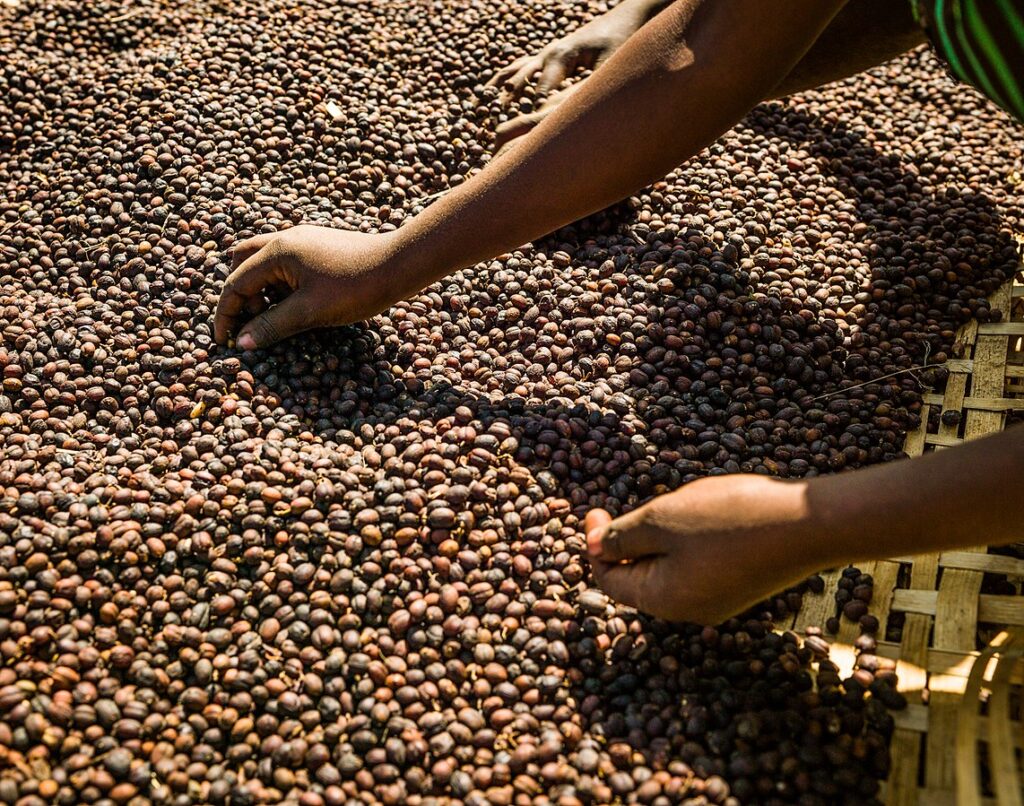
Ethiopian coffee: The Cradle of Culture
Source: https://coffeehunter.com/our-origins/ethiopia/
Ethiopia isn’t just the origin story of coffee, but Ethiopian coffee itself. it is a country where coffee is deeply woven into the fabric of life.
Here, we’ll explore Ethiopia’s unique coffee culture, brewing traditions passed down for generations, and the distinct flavours their beans produce.
A Land Steeped in Coffee History
Legend has it that coffee was discovered in Ethiopia by a goat herder who noticed his goats getting energetic after nibbling on berries from a certain tree. Whether true or not, coffee has been enjoyed in Ethiopia for centuries.
Today, Ethiopia remains one of the world’s top coffee producers, and the knowledge of growing and brewing coffee is a cherished tradition.
Yemen Joins the Coffee Story
Yemen also has claims to coffee fame. One story tells of a Sufi mystic who, inspired by energetic birds eating coffee berries, tried them himself and felt the energising effects.
Most likely, coffee beans travelled from Ethiopia to Yemen, where traders cultivated them and spread the word.
By the 15th century, coffee had sailed across the Red Sea to Yemen.. Its fame spread quickly, reaching Persia, Egypt, Syria, and Turkey by the 16th century.
Ethiopian Coffee’s Unique Flavour Profile
Most coffee around the world is grown on big farms, all neat and orderly. In Ethiopia, it’s a different story. Around 90% of their coffee grows wild, like picking berries in the forest! Only 10% comes from organised farms.
This wild, free-spirited way of growing totally affects the coffee’s flavour, making it one-of-a-kind, making it difficult to categorise its flavour profile.
But if you want to put a fat thumb over the general profile of coffee beans from the country, it is best described as having hints of fruity and floral flavours.
The processing method being either through natural methods or the washing process has a significant impact on the flavour of the coffee.

Source: Coffee berry sorting process, near Hawassa
Ethiopian Coffee Growing Regions

Source: https://allyopen.com/blogs/get-inspired/ethiopias-coffee-growing-regions-a-brief-explainer
Ethiopian coffee beans are grown in regions that are marketed under their regional name which overall are trademarked names with the rights owned by Ethiopia.
Namely Harar, Yirgacheffe, Limu, Jimma or Kaffa regions.
There are other regions: The Sidama region, where it is believed coffee had its origins, with beans from this region having hints of berries and citrus. Sidamo coffee includes Yirgachefe Coffee and Guji Coffee.
Kaffa region has coffee named after its birthplace; the Kaffa coffee, in south-west Ethiopia. It is also the birthplace of the Arabica plant, famed as the mother of all Arabica coffee plants.
Harar is in the Eastern highlands of Ethiopia, with its fruity, wine flavour. The shells of the coffee bean are used in a tea called hasher-qahwa. [read more]
The Ceremony: A Celebration of the Senses

Source: [Coffee ceremony]
An Ethiopian woman preparing Ethiopian coffee at a traditional ceremony. She roasts, crushes and brews the coffee on the spot.
Coffee in Ethiopia is more than just a drink; it’s a social experience. The traditional coffee ceremony, known as “Buna Tetu” (meaning “come drink coffee”), is a beautiful ritual, mainly for the purpose of getting together with relatives, neighbours, or other visitors.
The ceremony is typically performed by a woman, who roasts the beans over an open flame, filling the air with an intoxicating aroma.
The beans are then ground and brewed in a special pot called a “jebena” over hot coals.
The rich coffee is then poured into tiny cups and shared amongst friends and family, accompanied by other treats.
Ethiopia is also home to a unique coffee variety called “Heirloom.” Unlike many commercially grown beans, Heirloom varieties are not genetically modified and have been passed down through generations. These beans are known for their complex flavour profiles and contribute to the rich tapestry of Ethiopian coffee.
An Ethiopian Coffee Adventure Awaits You
Whether you’re a seasoned coffee connoisseur or just starting your exploration, Ethiopian coffee offers a unique and flavorful adventure.
-
1kg Kwararafa Light Roast | Vibrant & Fruity Nigerian Coffee (Ground or Whole Bean)
-
250g Kwararafa Light Roast | Vibrant & Fruity Nigerian Coffee (Ground or Whole Bean)
-
Buna Magic Mug
-
Chemex Combo: Brewing Perfection & Kwararafa Coffee (250gms)
-
Experience Clean Coffee Perfection: TGR 151 Chemex by Tigray Coffee Co.
-
Full Control, Full Flavor: TGR 171 French Press by Tigray Coffee Co.
-
Limited-Time! Save 15% – Tigray Moka Pot & Kwararafa Coffee Combo
-
Tigray Coffee Co. French Press & Coffee Combo: Unwind in Rich Flavor (250g)
-
Unlock Italian Coffee at Home: TGR 101 Moka Pot by Tigray Coffee Co.
- Rwandan Coffee: From Farmer to Fairtrade. - August 8, 2024
- The Rise of Coffee in Thailand - August 1, 2024
- Kenyan Coffee: From Colony to Connoisseur. - July 25, 2024



No Comments